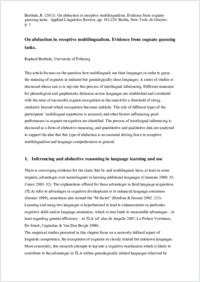On abduction in receptive multilingualism : evidence from cognate guessing tasks
BLE-BLL
- Berthele, Raphael Université de Fribourg
-
2011
Published in:
- Applied Linguistics Review / Li Wei. - de Gruyter. - 2011, vol. 2, p. 191-220
English
This article focuses on the question how multilinguals use their languages in order to guess the meaning of cognates in unlearnt but genealogically close languages. A series of studies is discussed whose aim is to tap into this process of interlingual inferencing. Different measures for phonological and graphematic distances across languages are established and correlated with the rates of successful cognate recognition in the search for a threshold of string similarity beyond which recognition becomes unlikely. The role of different types of the participants’ multilingual repertoires is assessed, and other factors influencing good performance in cognate recognition are identified. The process of interlingual inferencing is discussed as a form of abductive reasoning, and quantitative and qualitative data are analyzed to support the idea that this type of abduction is an essential driving force in receptive multilingualism and language comprehension in general.
- Faculty
- Faculté des lettres et des sciences humaines
- Department
- Département de plurilinguisme et didactique des langues étrangères
- Language
-
- English
- Classification
- Language, linguistics
- License
-
License undefined
- Identifiers
-
- RERO DOC 31418
- DOI 10.1515/9783110239331.191
- Persistent URL
- https://folia.unifr.ch/unifr/documents/302945
Statistics
Document views: 107
File downloads:
- Texte intégral: 360
